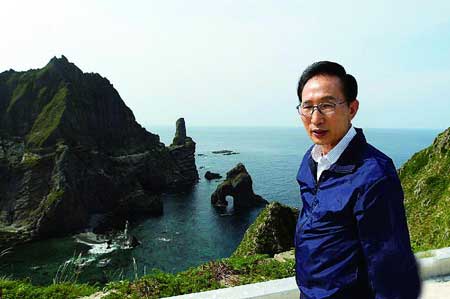 |
|
Lee paid a surprise August 10 visit to the Seoul-controlled islands, known as Dokdo in Korean and Takeshima in Japan. |
|
Japan on Thursday refused to take back a letter sent by its own prime minister after Seoul said it would not accept delivery of the note, as a row over islands threatened to descend into diplomatic farce. It was the latest move in an increasingly bitter tit-for-tat dispute that has engulfed two of Asia's largest economies for nearly two weeks. South Korea said earlier in the day it would return the protest from Yoshihiko Noda without answering it, for fear any move to acknowledge the missive would bolster Tokyo's claim to islands that both sides say they own. That sparked an angry response from Tokyo, which accused its neighbour of contravening diplomatic norms. "Under usual protocol, it is inconceivable that letters exchanged between leaders are sent back," Chief Cabinet Secretary Osamu Fujimura, the government's top spokesman, told a news conference. "I hope (South Korean President Lee Myung-Bak) will accept the letter, which was sent to deliver our prime minister's thoughts." The letter to Lee has not even made it to Seoul, having been kept at the South's embassy in Tokyo, foreign ministry spokesman Cho Tai-Young said, announcing the intention to hand the note back. But in what was beginning to look like a real live game of hot potato, the Japanese foreign ministry turned away a South Korean diplomat, believed to have been carrying Noda's letter, at the gate of the ministry building, NHK footage showed. "I'm sorry to say this, but returning a diplomatic letter is below even being childish," Senior Vice Foreign Minister Tsuyoshi Yamaguchi said at a press conference. The letter was subsequently put in the post, registered delivery, a spokesman at the foreign ministry in Seoul said. Despite their strong economic ties, the two countries have a frequently uneasy relationship, in which historical animosities constantly play in the background. That relationship has sharply worsened since Lee paid a surprise August 10 visit to the Seoul-controlled islands, known as Dokdo in Korean and Takeshima in Japan. (Read by Brian Salter. Brian Salter is a journalist at the China Daily Website.) (Agencies) |
韓日兩國(guó)的島嶼爭(zhēng)端近日引發(fā)外交風(fēng)波。日本首相野田佳彥致韓國(guó)總統(tǒng)李明博的親筆信被韓國(guó)退回,但退信遭到日本拒收。 這場(chǎng)針?shù)h相對(duì)的風(fēng)波愈演愈烈,亞洲兩大經(jīng)濟(jì)體韓國(guó)和日本卷入這場(chǎng)風(fēng)波已有近兩周時(shí)間。 韓國(guó)當(dāng)天早些時(shí)候表示,會(huì)退回日本首相的親筆信,不會(huì)給予回復(fù),因?yàn)閾?dān)心任何承認(rèn)這封信函的舉動(dòng)都會(huì)被認(rèn)為是支持日本獨(dú)占獨(dú)島(日本稱(chēng)竹島)的主張。韓日雙方都主張?jiān)搷u主權(quán)歸本國(guó)所有。 日本方面對(duì)韓國(guó)的舉動(dòng)非常惱火,指責(zé)韓國(guó)違反外交慣例。 日本政府首席發(fā)言人、內(nèi)閣官房長(zhǎng)官藤村修當(dāng)天在記者會(huì)上說(shuō):“從外交慣例上看,退回首腦之間親筆信這種事情是不可思議的。” “我希望韓國(guó)總統(tǒng)李明博會(huì)接受這封信,日本首相寫(xiě)這封信是為了表達(dá)自己的想法。” 韓國(guó)外交部發(fā)言人趙泰永說(shuō),這封信甚至沒(méi)有送到首爾,一直保存在韓國(guó)駐東京大使館。他還表示要把這封信退回。 但韓日雙方就像玩起了燙手山芋游戲。日本廣播公司的視頻顯示,韓國(guó)外交官前往日本外務(wù)省退信時(shí),被日本外務(wù)省拒之門(mén)外。 日本外務(wù)省副大臣山口壯在新聞發(fā)布會(huì)上說(shuō):“很遺憾地說(shuō),退回外交信函這種做法太幼稚了。” 韓國(guó)外交部一位發(fā)言人說(shuō),將采用郵寄掛號(hào)信的方式退回信件。 盡管韓日雙方經(jīng)貿(mào)來(lái)往密切,但關(guān)系時(shí)常陷入緊張局面,歷史原因?qū)е碌臄骋馐浅霈F(xiàn)這種情況的主因。 在韓國(guó)總統(tǒng)李明博8月10日突然到訪韓國(guó)控制的獨(dú)島(日本稱(chēng)為竹島)后,兩國(guó)關(guān)系急劇惡化。 相關(guān)閱讀 韓國(guó)球員倫敦賽場(chǎng)上打政治標(biāo)語(yǔ)被禁領(lǐng)獎(jiǎng) 倫敦奧運(yùn)朝鮮女足錯(cuò)配韓國(guó)國(guó)旗 韓國(guó)自殺率居高不下 當(dāng)局加強(qiáng)網(wǎng)絡(luò)監(jiān)察 韓國(guó)人結(jié)婚需備20萬(wàn)美金 房子彩禮是大頭 1/5韓國(guó)女性曾整容 專(zhuān)家揭整容根源 (中國(guó)日?qǐng)?bào)網(wǎng)英語(yǔ)點(diǎn)津 Julie 編輯:陳丹妮) |
|
Vocabulary: tit-for-tat: 針?shù)h相對(duì),以牙還牙 hot potato: 燙手山芋,比喻棘手的問(wèn)題 |
